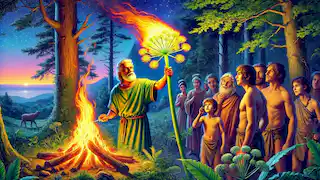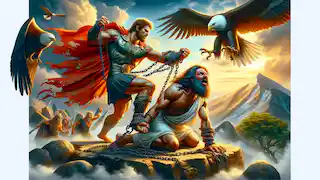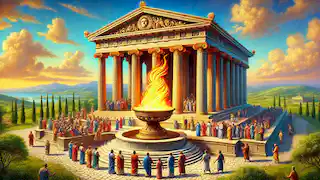Prologue
In the time of ancient Greece, the gods of Mount Olympus ruled over the world with absolute power. Among these gods was Prometheus, a titan known not just for his strength, but for his wisdom and compassion. Unlike his brethren, who reveled in their divine privileges, Prometheus had a profound empathy for mankind, the creations of the gods. He saw them as more than mere playthings of the divine; he saw potential, creativity, and a spark of the divine itself.
The gods, particularly Zeus, viewed humanity with disdain, believing them to be inferior beings meant to serve the gods and nothing more. They imposed harsh rules and limited the knowledge available to mortals, fearing that with too much knowledge, humans could become a threat to the divine order. It was within this context that Prometheus made a decision that would alter the course of history forever.
The Birth of Curiosity
Prometheus had always been fascinated by humans. He watched them struggle to survive, huddled in caves, shivering in the cold, and suffering from hunger. They were ignorant of the world's workings, unable to understand the cycles of nature or harness the resources around them. Prometheus's heart ached at the sight of their suffering, and he resolved to help them.
One day, while observing a group of humans trying unsuccessfully to start a fire with flint, Prometheus realized what they needed—fire, the symbol of knowledge and progress. Fire could cook food, provide warmth, and protect against wild beasts. It could also be a source of light in the darkness, both literally and metaphorically. However, fire was a divine gift, fiercely guarded by the gods, and forbidden to mankind.
Prometheus decided to defy Zeus's decree. He knew the risks; he understood that the wrath of Zeus could be severe. But Prometheus was willing to endure any punishment if it meant lifting humanity out of its wretched state. He believed that with fire, humans could evolve beyond their primitive existence and build civilizations that could reflect the glory of the gods themselves.
One night, under the cover of darkness, Prometheus ascended Mount Olympus. He crept into the forge of Hephaestus, the god of fire and craftsmanship, where an eternal flame burned. With great care, Prometheus took a small piece of this divine fire, hiding it within a hollow fennel stalk. This precious spark was the key to humanity's future.
The Gift of Fire
Prometheus descended from Olympus, his heart racing with the knowledge of what he had done. He traveled across the world, bringing the fire to the first humans. He showed them how to nurture the flame, how to use it to cook meat, keep warm, and fend off the wild beasts that prowled in the night. But more importantly, he taught them to see the fire as a symbol of enlightenment and innovation.
With fire, humans began to explore new possibilities. They crafted better tools, built stronger shelters, and even started to record their knowledge and experiences on clay tablets and stone carvings. The gift of fire sparked a revolution; it was the dawn of civilization. Communities grew into cities, and humans began to explore arts, sciences, and governance. They looked at the stars and wondered about their place in the cosmos, inspired to seek knowledge beyond their immediate needs.
Prometheus watched with satisfaction as humanity thrived. The fire had not only brought warmth and protection but had also ignited the flame of curiosity and ambition in the hearts of men and women. They no longer lived in fear of the dark; instead, they pushed back against it, seeking to illuminate the unknown.
However, Prometheus's actions did not go unnoticed. On Olympus, Zeus's anger simmered. He saw the fire not just as a tool for warmth but as a symbol of power and independence. With fire, humans no longer relied on the gods for survival, and this threatened the delicate balance of power. Zeus, known for his strict enforcement of divine law, viewed Prometheus's gift as a dangerous act of rebellion.
The Punishment of Prometheus
Zeus called a council of the gods to discuss the consequences of Prometheus's actions. The mood in the hall was tense, with gods and goddesses whispering among themselves. Zeus, with thunder in his voice, declared that Prometheus had betrayed the divine order and must be punished severely to prevent any further dissent. The gods, wary of Zeus's wrath, agreed.
Prometheus was summoned before the council. He stood tall and unyielding, knowing what was to come. Zeus pronounced his sentence: Prometheus would be chained to a rock on the desolate Caucasus Mountains, where every day an eagle, Zeus's sacred bird, would come to eat his liver. As an immortal, Prometheus's liver would regenerate each night, ensuring his suffering was endless.
The punishment was not just physical torment but also a message to all—no one, not even a titan, could defy Zeus without facing dire consequences. The gods watched as Prometheus was bound to the rock, his body strained against the chains, yet his spirit remained unbroken. As the eagle swooped down to feast, Prometheus endured the pain with stoic silence, his mind filled with thoughts of the humans he had helped.

The Seeds of Rebellion
While Prometheus suffered, the humans continued to prosper, unaware of the titan's sacrifice. The fire had become central to their lives, symbolizing knowledge, progress, and defiance against the capricious will of the gods. However, the whispers of Prometheus's fate reached the ears of the people. They learned of the titan who had defied Zeus to bring them the gift of fire. Prometheus became a symbol of heroism and sacrifice, and his story spread far and wide, inspiring both awe and a deep sense of gratitude.
Meanwhile, on Mount Olympus, the gods watched the unfolding events with mixed feelings. Some, like Athena and Hephaestus, admired Prometheus's courage and saw the benefits his gift had brought to humanity. Others, like Hera and Poseidon, were wary of the growing strength and independence of humans. The debate among the gods intensified, with some beginning to question Zeus's harshness.
Among those particularly troubled was Epimetheus, Prometheus's brother, who had once been tasked with distributing gifts to the animals and humans. Epimetheus regretted not foreseeing the consequences of his actions, especially the role his own wife, Pandora, had played in the spread of suffering among mankind. Pandora herself, despite her inadvertent release of the world's ills, was deeply affected by Prometheus's plight. She felt a kinship with him, as both of their actions had irrevocably changed the human world.
Pandora visited the temple where she had been gifted the infamous box, now a symbol of curiosity and consequence. She prayed for Prometheus, seeking a way to help him. Her prayers were heard by the goddess Themis, the embodiment of justice, who had grown increasingly uncomfortable with the unfairness of Prometheus's punishment. Themis approached Zeus, urging him to reconsider the severity of the sentence, arguing that the titan's intentions had been noble, even if they defied divine decree.
The Liberation
While the gods debated and humanity thrived, Heracles, the greatest of Greek heroes, was embarking on his Twelve Labors—a series of seemingly impossible tasks assigned to him as penance. Heracles was known for his immense strength and bravery, but also for his compassion and sense of justice. It was during one of these labors that Heracles learned of Prometheus's suffering.
The sight of Prometheus, chained and tormented by the eagle, moved Heracles deeply. He admired the titan's courage and felt compelled to act. Heracles had faced many challenges, but this act was driven by more than just duty; it was driven by a sense of kinship and respect for the sacrifices made by Prometheus. He decided to free the titan, regardless of the consequences from Zeus.
Heracles approached the Caucasus Mountains, where Prometheus lay bound. With a powerful swing of his club, Heracles shattered the chains that held Prometheus. The eagle, startled by the hero's presence, fled. Prometheus, weakened but grateful, was free at last. Heracles then brokered a deal with Zeus: in exchange for Prometheus's freedom, Heracles would complete one additional labor—a task of great difficulty and danger. Zeus, impressed by Heracles's courage and determination, agreed to the terms.

The Legacy of Fire
Prometheus, though freed from his chains, bore the scars of his punishment. His act of defiance had left an indelible mark on the world. The fire he had given to humanity had sparked a series of unprecedented advancements. The age of darkness and ignorance had given way to an era of enlightenment and discovery. Humans, now empowered with the gift of fire, expanded their knowledge of the world. They built cities, developed arts and sciences, and pondered the mysteries of existence.
The gods observed these changes with a mix of pride and concern. While some gods like Athena were pleased to see humanity's growth, others feared that humans might one day challenge the divine order itself. Nevertheless, the presence of fire among mortals was irreversible. It had become a fundamental part of human life and culture, a symbol of knowledge, civilization, and the enduring spirit of defiance against oppression.
Prometheus's legacy extended beyond the material benefits of fire. He had shown that even the most powerful rulers could be challenged, that one could stand up for what was right, even in the face of immense power. This lesson resonated not only with humans but also with the gods. The story of Prometheus became a cautionary tale, a reminder that compassion and justice were as crucial as strength and authority.
The Eternal Flame
In the heart of Greece, a grand temple was built to honor Prometheus. At its center burned an eternal flame, a symbol of the knowledge and enlightenment he had brought to humanity. The Flame of Prometheus became a place of pilgrimage, where scholars, philosophers, and curious minds gathered. It was said that those who meditated by the flame could gain insight and inspiration, feeling a connection to the divine spark within themselves.
The temple also became a hub for learning and culture. It housed a vast library containing scrolls and tablets on various subjects, from mathematics and astronomy to philosophy and art. The priests and priestesses of the temple were dedicated to preserving and spreading knowledge, seeing it as a sacred duty to honor Prometheus's sacrifice. They believed that the true tribute to the titan was not in stone and marble, but in the continuous pursuit of wisdom and understanding.

Prometheus, though no longer physically present, was believed to watch over the temple. His spirit was said to reside in the flame, guiding those who sought knowledge and challenging those who wielded power to do so wisely and justly. The temple became a beacon of hope, a place where people from all walks of life could come to seek guidance and inspiration.
Epilogue: The Flame Within
The story of Prometheus and the Flame of Prometheus endures, not just as a myth but as a profound allegory about the human condition. It teaches that the quest for knowledge is a noble pursuit, one that requires courage, sacrifice, and a willingness to challenge the status quo. It also warns of the dangers of tyranny and the importance of justice and compassion.
The eternal flame continues to burn, both in the temple and in the hearts of those who hear the story. It symbolizes the unquenchable thirst for knowledge and the indomitable human spirit. Prometheus's gift was not merely the physical fire, but the spark of enlightenment that drives humanity to explore, innovate, and improve.

In every act of discovery, in every creation, and in every challenge to unjust authority, the spirit of Prometheus lives on. The Flame of Prometheus is more than a myth; it is a call to action, a reminder that each of us carries a spark of the divine within. It is up to us to nurture that flame, to use it to illuminate the world and to ensure that knowledge, justice, and compassion continue to burn brightly.



















